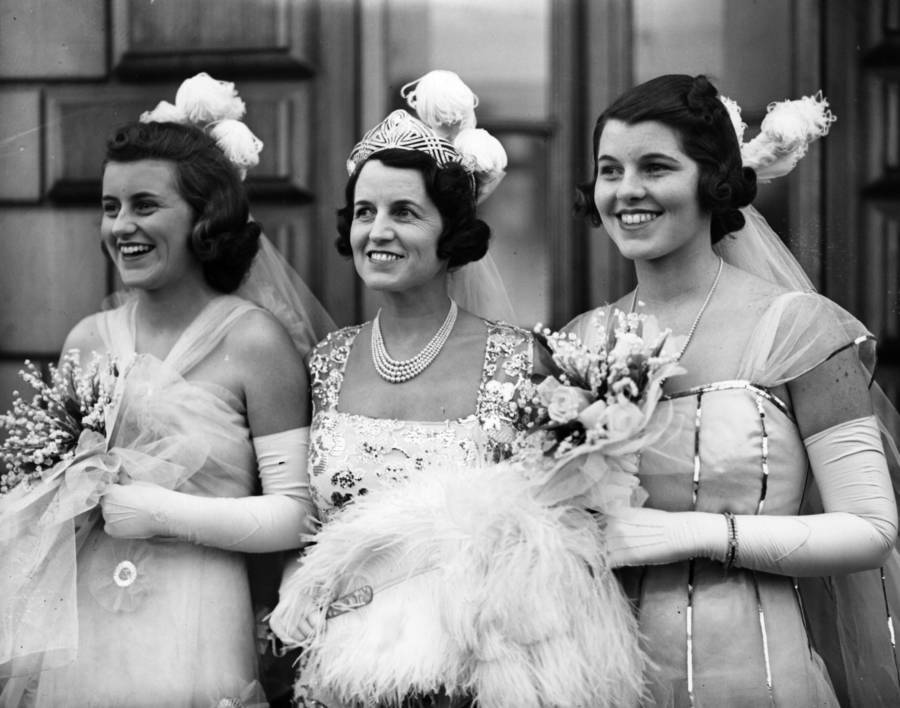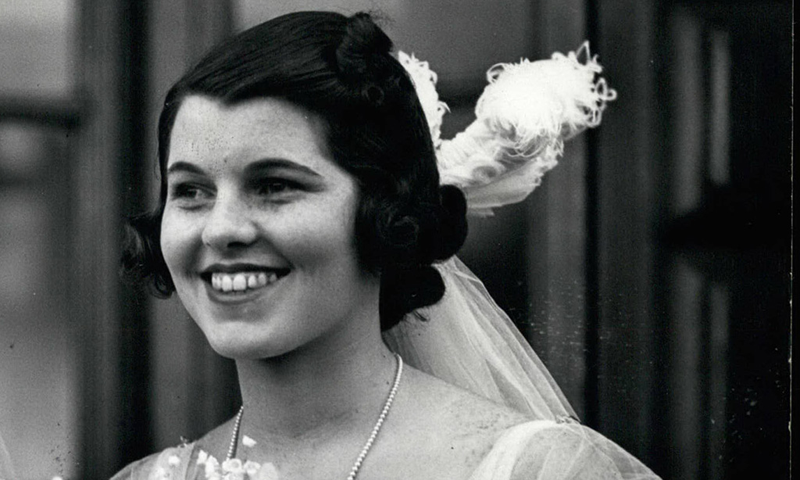The Unspoken Story Of Rosemary Kennedy: A Family's Hidden Truth
The Kennedy name, it's almost, often brings to mind images of power, influence, and a certain kind of American royalty, is that right? Yet, within this famous family, there existed a story long kept from the public eye, a poignant tale of vulnerability and a life profoundly altered. This is the story of Rosemary Kennedy, the eldest daughter of Joseph and Rose Kennedy, and a sister to future President John F. Kennedy and Senator Robert F. Kennedy. Her life, in a way, offers a deeply moving glimpse into the private struggles of a prominent dynasty, and the societal attitudes towards intellectual disability during her time.
For many years, Rosemary's existence was more or less a secret, a quiet shadow within the bright glare of her family's public life. She disappeared from public view in 1941, seemingly vanishing without a trace, only to have her story gradually come to light decades later. This disappearance, as a matter of fact, was the result of a drastic medical procedure, a lobotomy, orchestrated by her father, which left her permanently incapacitated.
Her experience, very much a hidden chapter for so long, has since become a powerful symbol, prompting reflection on medical ethics, family secrets, and the enduring impact of a life lived differently. We're going to explore Rosemary's journey, the challenges she faced, the choices made for her, and the surprising, lasting influence she had on her family's efforts to help others with disabilities, inspiring, you know, some really significant changes.
- Uiiu Cinema.linkmaz
- 7movierulz 2024 Ndash Your Ultimate Guide To Downloading Movies.linkmaz
- Overtime Megan Leaked Nudes.linkmaz
- Ullu Web Series Movierulz The Ultimate Guide To Exploring Indias Popular Digital Content.linkmaz
- Are Justin Trudeau Melanie Joly Dating Rumors Explored.linkmaz
Table of Contents
- Biography of Rosemary Kennedy
- Rosemary's Lasting Influence
- The Era of Lobotomy
- Frequently Asked Questions About Rosemary Kennedy
- A Life That Shaped a Legacy
Biography of Rosemary Kennedy
Early Life and Challenges
Rosemary Kennedy, born Rose Marie Kennedy, entered the world on September 13, 1918, as the third child and eldest daughter of Joseph and Rose Kennedy. She was, in fact, born just one year after her brother John, who would later become president of the United States. From a very young age, it became clear that Rosemary, affectionately known as "Rosie" to her family, was a little different from her siblings. She reportedly exhibited developmental delays, a quiet struggle that, you know, unfolded within the bustling Kennedy household.
Her early milestones, for instance, were slower in coming. She was slower to crawl, then slower to walk, and also slower to speak than her boisterous brothers. As she reached school age, she experienced learning difficulties, which, in some respects, made formal education a real challenge for her. She was described as having mild mental retardation, a condition that, as a matter of fact, manifested in her being perceived as slow, shy, and yet, very good-natured. This early period of her life, while perhaps not widely known at the time, certainly set the stage for the difficult decisions that would later be made on her behalf.
Personal Details and Bio Data
| Full Name | Rose Marie "Rosemary" Kennedy |
| Born | September 13, 1918 |
| Died | January 7, 2005 |
| Parents | Joseph P. Kennedy Sr. and Rose Fitzgerald Kennedy |
| Siblings | John F. Kennedy, Joseph P. Kennedy Jr., Kathleen Kennedy, Eunice Kennedy Shriver, Patricia Kennedy Lawford, Robert F. Kennedy, Jean Kennedy Smith, Edward M. Kennedy |
| Known For | Eldest daughter of Joseph and Rose Kennedy; subject of a lobotomy that left her incapacitated; her life inspired disability advocacy efforts, including the Special Olympics. |
The Lobotomy and Its Aftermath
The year 1941 marked a profound turning point in Rosemary Kennedy's life, a moment that would alter her existence forever. Her father, Joseph Kennedy Sr., in a desperate attempt to address her perceived difficulties and, arguably, to maintain the family's public image, made a devastating decision. He arranged for Rosemary, then just 23 years old, to undergo a lobotomy. This procedure, which involved severing connections in the brain's frontal lobe, was, you know, a relatively new and experimental form of psychosurgery at the time, often performed with little understanding of its long-term effects.
- Abbyberner Nudes.linkmaz
- Supreme Values Mm2.linkmaz
- Shubhashree Sahu Mss Video.linkmaz
- Jason Luv And Eva Elfie.linkmaz
- Teach Me First For Free.linkmaz
The outcome for Rosemary was tragic. The lobotomy left her permanently incapacitated, a far cry from the intended improvement. She became unable to walk or speak properly, and her cognitive abilities were severely impacted, leaving her profoundly damaged. Following the disastrous procedure, Rosemary was institutionalized, effectively vanishing from public life. She was sent to an institution in Wisconsin called St. Coletta's, where, as a matter of fact, she would spend the next 60 years of her life, living out her days away from the family spotlight.
A Family's Secret
For many years, the American public knew very little about the eldest Kennedy daughter, Rosemary. Her condition and the circumstances of her disappearance were, quite simply, kept a secret by the family. This silence, you know, was a reflection of the profound shame and stigma surrounding intellectual disability and mental illness during that era. Families often felt compelled to hide such challenges, fearing social judgment and the potential damage to their reputation.
It wasn't until the 1970s, more than three decades after the lobotomy, that the Kennedy family publicly acknowledged Rosemary's condition and the procedure she underwent. This belated revelation, in a way, shone a light on a dark secret of a powerful dynasty, sparking conversations about medical ethics, family privacy, and the treatment of individuals with disabilities. The family's initial silence, basically, highlights how deeply ingrained the societal prejudices were, and how much courage it took, eventually, to speak openly about such matters.
Rosemary's Lasting Influence
Inspiring the Special Olympics
Despite the tragic trajectory of her personal life, Rosemary Kennedy's existence had a profound and lasting influence on her family, inspiring them to take up work for people with intellectual and physical disabilities. Her younger sister, Eunice Kennedy Shriver, in particular, was deeply moved by Rosemary's struggles and the lack of opportunities available for individuals with intellectual disabilities. It was, you know, this personal connection that fueled Eunice's passion and dedication.
Rosemary's mental problems and the challenges she faced, in fact, helped to inspire the creation of the Special Olympics. This global movement, which provides year-round sports training and athletic competition for children and adults with intellectual disabilities, grew directly from the Kennedy family's commitment to ensuring that individuals like Rosemary had a chance to participate, to be recognized, and to experience joy and achievement. Her life, therefore, became a powerful catalyst for a movement that has touched countless lives around the world, giving a voice and opportunities to many.
A Legacy of Compassion
Rosemary was, in essence, the "lost Kennedy daughter," disabled from birth and left profoundly damaged after her lobotomy at the age of 23. Yet, her story, as a matter of fact, had a lasting influence on her family's charitable endeavors and their broader public service. The Kennedy family, particularly through the efforts of Eunice Kennedy Shriver and later, Senator Edward M. Kennedy, became leading advocates for disability rights and inclusion.
Their work, rooted in Rosemary's experience, led to significant advancements in legislation and public awareness, aiming to create a more accepting and supportive society for people with intellectual disabilities. This commitment, you know, transformed a private family tragedy into a public mission, demonstrating how even the most difficult personal circumstances can spark a powerful movement for good. Her life, though marked by immense hardship, ultimately helped to shape a legacy of compassion and advocacy that continues to resonate today. You can learn more about the Special Olympics and their mission, which, basically, owes so much to this inspiration.
The Era of Lobotomy
Rosemary Kennedy's lobotomy, while a personal tragedy for her and her family, was, in fact, part of a broader, troubling chapter in medical history. Between 1936 and the 1970s, an astonishing 40,000 to 50,000 Americans received psychosurgeries, including lobotomies, in government hospitals, private institutions, and doctors' offices. This procedure, once hailed by some as a revolutionary treatment for various mental health conditions, was, you know, often performed without a full understanding of the brain's complexities or the long-term consequences for patients.
The practice was, more or less, a desperate measure in an era when effective treatments for severe mental illness were scarce. Many patients, like Rosemary, were left permanently disabled, their personalities altered, and their lives irrevocably changed. The story of Rosemary Kennedy, therefore, also serves as a stark reminder of the ethical considerations in medicine and the importance of patient rights and informed consent. It's a period that, as a matter of fact, we look back on with a mix of historical understanding and a deep sense of caution about medical interventions that impact the very core of a person's being.
Frequently Asked Questions About Rosemary Kennedy
What was Rosemary Kennedy's disability?
Rosemary Kennedy reportedly exhibited developmental delays from a young age, being slower to crawl, walk, and speak than her siblings. She experienced learning difficulties when she reached school age and was described as having mild mental retardation. This condition, in a way, presented challenges throughout her early life, leading to the fateful decision regarding her medical care.
How did Rosemary Kennedy's lobotomy affect her?
The lobotomy performed on Rosemary Kennedy in 1941 had devastating and permanent effects. It left her severely incapacitated, unable to walk or speak properly, and her cognitive abilities were profoundly impacted. She required constant care for the rest of her life, spending 60 years institutionalized at St. Coletta's in Wisconsin. It was, you know, a truly tragic outcome.
What was the Kennedy family's reaction to Rosemary's condition?
For many years, the Kennedy family kept Rosemary's condition and the lobotomy a secret from the public. Her existence was largely hidden, reflecting the shame and stigma associated with intellectual disability and mental illness during that era. It wasn't until the 1970s that the family, particularly through the efforts of Eunice Kennedy Shriver, began to publicly acknowledge Rosemary's story, leading to their significant advocacy for people with disabilities. This, you know, was a slow but important shift.
A Life That Shaped a Legacy
Rosemary Kennedy's life, though marked by profound challenges and a deeply personal tragedy, stands as a testament to the enduring power of a single individual's story to spark change. Her journey, from a child with developmental delays to a woman whose life was irrevocably altered by a medical procedure, reveals much about the societal attitudes of her time. Yet, more importantly, it highlights how her experience became a quiet but powerful catalyst for her family's remarkable commitment to disability advocacy. Even today, her story continues to resonate, reminding us of the ongoing importance of compassion, inclusion, and understanding for all individuals, regardless of their abilities. You can, for instance, learn more about the historical context of this period, which, basically, helps to put Rosemary's story into a broader perspective.
- Jade Castrinos Drugs.linkmaz
- Aishah Sofey Leaks Unraveling The Truth Behind The Controversy.linkmaz
- Subhashree Sahu Bathroom.linkmaz
- Mkvmoviespoint Bollywood Movies Your Ultimate Destination For Indian Cinema.linkmaz
- Meet Melanie Jolys Kids A Closer Look At Her Family Life.linkmaz

Rosemary Kennedy Biography - Facts, Childhood, Family Life & Achievements

Rosemary Kennedy, JFK's Sister Who Was Forcibly Lobotomized

Rosemary Kennedy: The Tragic Story of Why JFK's Sister Disappeared from